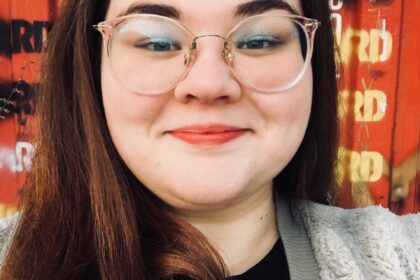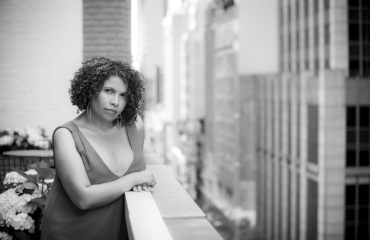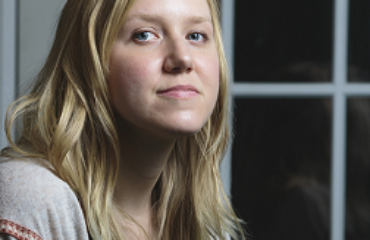MEMORY FIELDS by Liz Howey

The orchard is beautiful. Meets the postcard standard of picturesque, as promised. Lines of foliage haloed by the rising sun, shades of green and brown and golden red, and for a second Maggie slips, imagines her and Brendon and a child that won’t exist. A little girl—no, a boy, a little arrogant boy, a mini-Brendon. She imagines Brendon lifting their phantom son to pick an apple, round cheeks dimpled by matching smiles, and thinks, yes, God, wow, the orchard is so beautiful. Too beautiful, really, because nothing hints at the section in the far back, the bodies curled deep in the dirt beneath.
Maggie turns from the orchard, looks at Brendon still in the passenger seat of their car, one of his long legs thrust out into the gravel of the parking lot, the other limp in the footwell. She reaches for his bowed head, runs her fingers through his thinnest patch of hair. “Jus’ a min’,” he says, panting through syllables. He leans forward, and Maggie doesn’t know if he’s leaning into her, if he wants her hand on his scalp, or if he’s just trying to get his head between his knees to gasp through nausea. But he doesn’t say either way, and Maggie can’t bring herself to ask.
*
It’s not a day for jokes, but once Brendon manages to stand, he can’t help himself. He grins, he chuckles, he pretends to gag when Maggie holds her palm out to a cow. While they wait for the owner of the orchard to meet them, Maggie circles strawberry scented hand sanitizer into her skin. Brendon says, “Can you imagine if I just dropped dead right here? That’s a discount, right? Just toss me in a wheelbarrow, save on gas.”
Her therapist suggested he makes people uncomfortable as an assertion of control, a way to cope, but when Maggie asked what it meant that he tries to make her uncomfortable, that he laughs about dying as if she should join in, that he’d make her drive two hours to visit his bio-grave, her therapist said, “What do you think he expects from you? Both now and then later, after he’s gone?” But Maggie still has both sets of grandparents, the tabby she rescued as a teenager: she’s never known death this intimately. The last year’s been nothing but stumbling, trying to keep her chin high even as Brendon started considering arrangements like a child marking up a Christmas catalogue.
To her therapist, she said, “I think he needs me to be there for him,” and last night, to Brendon, as she threw a book so hard at the living room floor its spine split, Maggie yelled, “Do you always have to ask for so much?”
*
Maggie remembers when cancer became tangible, when it took on shape and morphed into something that looked like her husband. When the doctor spoke and Brendon nodded, when Brendon took off his hat to put it back on, when Brendon pulled and pinched at the navy brim until his hand collapsed, knuckles tented over his eyes. As he cried, Maggie pressed her fingers to the back of his neck and felt neither of their bodies.
Her first thoughts had been practical: the warehouse was always desperate for workers and Brendon was their best. They’d take him back when this was all done, no problem. Of course, she’d had no idea what sick leave would look like, and that was something to consider in their budget, what with the new house that wasn’t new at all, with its faucets that constantly spat water and wiring that slurped electricity. The empty room just off their bedroom would stay barren despite their plans the year before, but that was alright, that was fine. There’d be time to regroup. They would change, the both of them, because treatment attacked more than just the illness, and chemo took hours, the clear and brown bags draining slowly above their heads as they flipped through fuzzy cable on a tube TV, but it wasn’t all terrible. Brendon said, “Lemonade out of some really shitty lemons, huh, babe? We have dates scheduled every other week now, no excuses. You bring the champagne flutes; I’ll swipe the ginger ale. Maybe I’ll feed you some pudding, yeah? All sexy like? Here comes the airplane, baby.” Maggie loved that, his warm stupidity, his optimism. He sat in the cushioned recliner with her next to him in the stiff-backed chair, and they laughed as chemicals roiled through his body, bickering in good spirits over what to watch. Brendon protested that Cheaters wasn’t a romantic choice, though Maggie disagreed, saying, “It puts our life into perspective! We’re here, together, Joey Greco nowhere in sight—isn’t that promising? Look at us, so good at being married.” Everything would be okay, she thought, because thirty-year-olds get cancer, sure, but they don’t die.
Now, seated in the back of a golf cart, the owner of the orchard jostling them over root and gravel, Maggie keeps her palms flat on the vinyl cushion under her thighs. She wonders if there’s a world where Brendon left her out in the waiting room for that very first doctor’s appointment, where he smiled at her with dried eyes, where he lied, where he said everything was fine and then valued her needs over his. Where he packed a bag in the middle of the night, kissed her forehead sweetly while she slept, then disappeared into a spill of moonlight and started a new, temporary life. It’s silly—if he’d done that, she would’ve tracked him by his credit cards, would’ve still ended up here, in this orchard, this would-be-graveyard—but the imagined gesture makes her feel the most loved she’s felt since… Well, she doesn’t know, because feeling loved isn’t as important as proving the depth of her own.
Today, she’s doing her best, though the sway of the golf cart curdles the breakfast in her belly. Last night’s fight lingers. She wants to nurse her anger, but that’s not allowed anymore, so she keeps it behind her teeth, swallows until her tongue tacks to the roof of her mouth.
At their last chemo session, after they spent two long hours waiting for the magnesium to drip, after they shared a tuna sandwich and giggled at the knitted hats passed out by a survivor with an abundance of glitter-speckled yarn, Brendon pronounced, “I’m doing this for you.” And Maggie felt loved, she did, because the newest formula bubbled in red welts on his face and ate at his stomach, left him miserable for the teeny stretch between doses, but still, he smiled as he sat in the vinyl recliner next to her. He said, “I’m doing this for you,” but as they walked out, he dropped her hand to lean over the cluttered counter of the nurses’ station. He rang the bronze bell that meant a patient had finished their last treatment. Maggie tugged him away, saying, “Stop, B,” because people tethered to IVs cheered, because some of the nurses who didn’t know Brendon or his medical records punched the air and yelled, “Congratulations!”
In the car, Maggie cried. Ignored him until he vomited out the window and then apologized until he did, too. But his apology didn’t change his decision: Brendon was done. Though the doctors had already warned that best case was judged in slivers of time, she hadn’t thought stopping chemo was really an option. The bell signaled an end she didn’t understand, one she hadn’t agreed to.
*
The orchard has barely opened, and it’s mostly silent, just the sparse chirp of birds and the familiar grinding of tractors. Brendon says, “It’s real peaceful here, quieter than home. And not as much dung in the air, so, y’know, there’s a point in its favor.” Maggie looks down at her bare nails, curls her ring finger to pick at her thumb. She knows cornfields—cried in them when hide and seek stopped being fun, screamed as a monster chased her with a toothless chainsaw, unbuttoned her shirt in one, as Brendon, a nervous boy with a pack-a-day habit even at sixteen, laughed before he choked. But she doesn’t see much in this place, this orchard that’s left Brendon so obviously impressed. He’s gone wide-eyed, and Maggie wants to say something like, You can’t be serious, or, I’ll be buried next to you, someday, so my opinion matters, too, but after last night, after his selfishness, she knows her words aren’t worth much at all.
In the golf cart, Brendon sits with one arm wrapped around his stomach, the other braced on the metal bar that runs behind the front seats. Under them, the cart’s engine whines, deep and constant. When the owner tentatively asks how Brendon’s feeling, Brendon says, “Ah, not too bad. There’s a, uh, constant baseline now of just general shittiness. Nothing to be done.” He coughs as they double back around the wooden gift shop, past strings of apple garland that hang limp off the mint awning. The orchard owner glances over his shoulder, says, “Remind me to give you folks a voucher for a pie.” Maggie looks at Brendon and Brendon looks at the horizon. He says, “Oh, wow, that’s so kind, thanks.” She wets her palms with the hand sanitizer from her purse. The sweet smell of strawberry hangs in the air for a handful of breaths, just long enough to close her eyes and pretends she’s home.
*
Brendon kisses the drop of her jaw, the weak spot under her ear. He likes to kiss her there, said once that it reminded him of a dog’s belly, soft and warm and covered in down. Maggie stared at him until he said, “What?” She hit his shoulder. She said, “You’re so lucky I talk to you,” and then laughed while he backtracked, as he sputtered over the virtues of dogs, their beauty and sweetness and loyalty. Today, when Brendon kisses the drop of her jaw, she ignores him. The orchard owner stops the golf cart to let a riding lawnmower pass. Maggie says, “Oh, the grass is so green here, wow,” and then, inexplicably, “I like grass.” Though she wasn’t trying to be funny, Brendon roars. The shift of muscle funnels the hollows around his eyes to down under his cheekbones, thins his chapped lips. Giggling, he taps her shoulder, waits. She says nothing.
They’ve seen most of the orchard, the gift shop and the pens of goats and cows and chickens and the blank fields of dirt that will eventually be dotted with pumpkins and the pockmarked earth where campers can toast marshmallows and the thigh-high hay maze. It’s an odd sort of pussyfooting—Maggie knows, and obviously the owner of the orchard knows, that they’re not here to see the actual orchard—but for the past fifteen minutes, the golf cart has been gliding up and down wide lanes bordered by apple trees. Still, Brendon taps at her shoulder, grins, says, “You’re the apple of my eye,” and waits for her to scoff, eyebrows raised so high his gaunt face stretches mask-like. Maggie scoffs. She rolls her eyes, smiles, laughs. Brendon says, “This place is almost as pretty as you.” She kisses his big head, and he folds their fingers together, squeezes once as if to confirm his presence. He says, “I’ve still got it,” and then, “I’ve still got you, huh?” Maggie’s response falls, easy and gentle: “Obviously.”
*
Memory Fields is as far away from the parking lot as the orchard goes, sectioned off by a tall black gate, long past the wooden gift shop and disappointing pumpkin patch, opposite the barn with the lazy horses and feral cats, parallel to the neat and endless rows of carefully spaced apple trees. When they finally get there, Brendon checks his watch, taps Maggie’s purse, and she thumbs open Thursday’s morning half of his pill organizer, watches as he swallows dry, as he winces. “We don’t let anybody but family and employees in here,” the orchard owner says. He stops the golf cart at the edge of a gravel cul-de-sac, right in front of the first row of fruit-less trees. “You’d have a lifetime pass to the orchard, Mrs. Miller, and you’d just let the folks at the front know when you visit. Somebody’ll always be there to take you back.”
Brendon leans into her. He puts his left hand on her right thigh, makes her bear his weight. She wipes the sweat off his forehead with her fingers as the orchard owner says, “We use biodegradable material for the pods, durable but still good for the soil. The bodies, the people, you know, they break down in a contained way, in the pod, so the sapling gets the nutrients. It’s really something, let me tell you. It’s beautiful.” And it is beautiful, Maggie can’t deny that: a hundred or so trees, mismatched in height, some no longer than her legs, some so tall her eyes sting with sun, all sturdy, all wrapped with a delicate silver chain from which a palm-sized plaque hangs. Underneath, she imagines, the tangle of root and corpse is umbilical.
“I don’t think I can get up,” Brendon says. “Maggie, would you go look? Let me know if it’s as good as the pictures, huh? For me, baby. Please.”
There’s a graveyard ten miles from their house. The internet has told her how she can arrive by car, by public transit, by foot. Before they got in the golf cart, the owner of the orchard pulled her aside, said, “It’s a pricey thing, I can’t lie, but I’ll give you some paperwork that discusses monthly plans,” and Maggie appreciated that he said this to her, not Brendon, because Brendon plans without planning, deals in arrangements without the permanence of documentation. No will, no signatures, nothing but, Oh, wouldn’t this be nice. She wouldn’t want the orchard owner to trust her husband’s words—they’ll mean little once he’s gone.
Maggie holds Brendon’s hand still on her leg. She will do this, will leave him behind in the golf cart to kneel in front of a tree that’s sprouted strong from death, will stay silent, keep her shoulders high and her mouth softly curled, solemn but fond. She’ll think of nothing deeper than the spongy press of grass beneath her knees, how the earth steals her heat and in return seeps cold wet through her jeans. She won’t look back at Brendon because it’ll ruin this indulgence, the easiest thing he’s asked for yet.
*
Maggie curls an arm around Brendon’s waist to open the passenger door. He stands in front of her, hands on her shoulders, breath metallic under her nose. Panting, he says, “Like we’re dancin’.” She says, “I don’t dance with geeks,” and shuffles him back until his ass hits car. His hands slide from her shoulders, to her ribcage, to her hips as he descends. She asks, “Can you do your seatbelt?” He sighs, shakes his head, throws his arm across his chest to try. Eventually, he gets angry, gives up. In that way, he’s become reliable. Like last night as she tried to read but mostly stared at the ugly paneling in the living room, wondering which color they’d paint the walls if they could afford it, if they had the strength, when Brendon looked up from his laptop to say, “Let’s have a kid. I’m serious. We can do it now, or you can freeze my sperm.” And Maggie said, “No. Jesus Christ, no,” so violently that her thumb twitched and she lost her page.
She would wipe vomit off his face and hold him while he cried and she herself wouldn’t cry when they learned the cancer had its eye on his brain and she’d be with him every second at the hospice and she’d kiss his lips when they purpled and she’d polish his tombstone weekly for six months at the cemetery close to their house and she wouldn’t marry again—either because she loved him so much or because once was enough and nothing was worth such risk—but this, a child, a living monument to his life, to her grief, was not something she would do. “Maggie, listen,” he said, and she threw her book, yelled, “Do you always have to ask for so much?”
Brendon lets her buckle him in without complaint. Two years ago, he would’ve made some stupid grab at her chest, would’ve nuzzled her neck, would’ve complained about his natural right to drive. Now, he closes his eyes, melts into the seat, head curled on his shoulder, hands twisted in the too-wide stretch of space between his skinny thighs. “Thanks, baby,” he says. The words are so tender that she can almost forget him saying, “Fine, whatever. Why would we have a fucking kid anyway? I’ll be dead, and you don’t have a caring bone in your goddamn body,” and then, even worse, “What makes you think any of this is about you, Maggie?” She kisses his head again, holds his cheek, says, “Of course, B.”
Brendon says, “Ready whenever you are,” and Maggie shuts his door. She presses her fingers to the roof of the car, metal sun-hot, blistering, and doesn’t let herself look back at the orchard and the spaces they could’ve fit.


